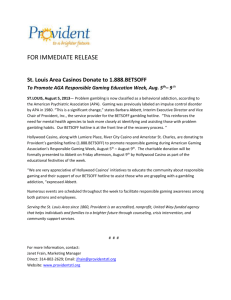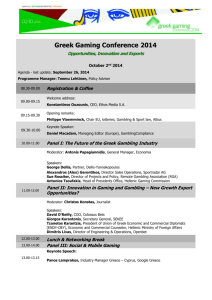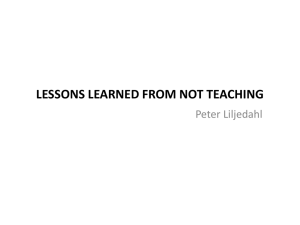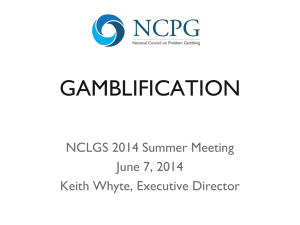Findings of the Competition Policy Review
advertisement
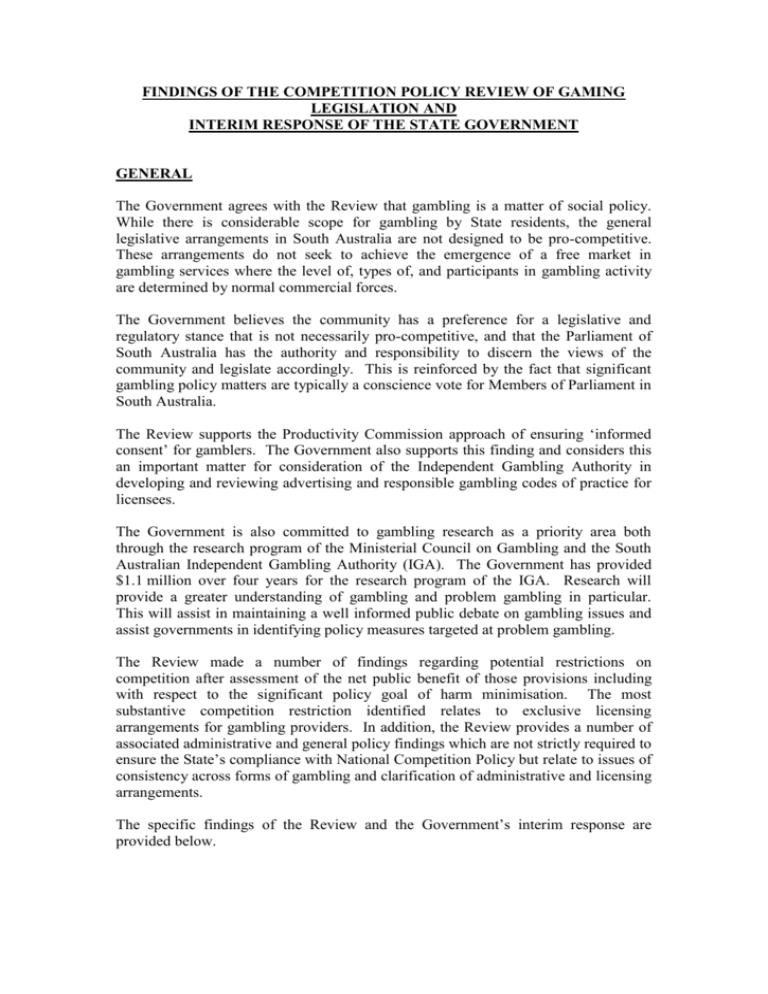
FINDINGS OF THE COMPETITION POLICY REVIEW OF GAMING LEGISLATION AND INTERIM RESPONSE OF THE STATE GOVERNMENT GENERAL The Government agrees with the Review that gambling is a matter of social policy. While there is considerable scope for gambling by State residents, the general legislative arrangements in South Australia are not designed to be pro-competitive. These arrangements do not seek to achieve the emergence of a free market in gambling services where the level of, types of, and participants in gambling activity are determined by normal commercial forces. The Government believes the community has a preference for a legislative and regulatory stance that is not necessarily pro-competitive, and that the Parliament of South Australia has the authority and responsibility to discern the views of the community and legislate accordingly. This is reinforced by the fact that significant gambling policy matters are typically a conscience vote for Members of Parliament in South Australia. The Review supports the Productivity Commission approach of ensuring ‘informed consent’ for gamblers. The Government also supports this finding and considers this an important matter for consideration of the Independent Gambling Authority in developing and reviewing advertising and responsible gambling codes of practice for licensees. The Government is also committed to gambling research as a priority area both through the research program of the Ministerial Council on Gambling and the South Australian Independent Gambling Authority (IGA). The Government has provided $1.1 million over four years for the research program of the IGA. Research will provide a greater understanding of gambling and problem gambling in particular. This will assist in maintaining a well informed public debate on gambling issues and assist governments in identifying policy measures targeted at problem gambling. The Review made a number of findings regarding potential restrictions on competition after assessment of the net public benefit of those provisions including with respect to the significant policy goal of harm minimisation. The most substantive competition restriction identified relates to exclusive licensing arrangements for gambling providers. In addition, the Review provides a number of associated administrative and general policy findings which are not strictly required to ensure the State’s compliance with National Competition Policy but relate to issues of consistency across forms of gambling and clarification of administrative and licensing arrangements. The specific findings of the Review and the Government’s interim response are provided below. 2 EXCLUSIVITY FINDINGS 1. Exclusive licence for TAB Review Finding Meets NCP requirements. Interim Government Response The Government concurs with the Review finding. The community would incur a financial loss from compensation to UNITAB if licences for off course betting operations were available to others. There are advantages in respect of probity regulation and harm minimisation to have only one major authorised betting provider. The case for continuation of an exclusive licence beyond the current exclusivity period for TAB will be evaluated toward the end of that time, including having regard to financial benefit available to the community from granting exclusivity, and the regulatory and policy options available to ensure a responsible gambling environment. 2. Exclusive licence for Casino Review Finding Meets NCP requirements. Interim Government Response The Government concurs with the Review finding. The community would incur a financial loss from compensation to SkyCity if Casino licences were available to others. There are advantages in respect of probity regulation and harm minimisation to have only one Casino. The case for continuation of an exclusive licence beyond the current exclusivity period will be evaluated toward the end of that time, including having regard to financial benefit available to the community from granting exclusivity, and the regulatory and policy options available to ensure a responsible gambling environment. 3. Effective exclusivity/market position of Lotteries Commission Review Finding Meets NCP requirements. Interim Government Response The Government concurs with the Review finding. The Government considers that the availability and terms of lottery products through the SA Lotteries Commission are adequate without change to current market arrangements and that the community obtains a financial benefit from current arrangements. 3 OTHER FINDINGS 4. Lottery and Gaming Act 1936 With respect to the administration of the Act, the Review suggests that the delegated administration of the Lottery and Gaming Act be transferred to the Liquor and Gambling Commissioner. In recognition of the existence of some administrative burden arising from the implementation of the Lottery and Gaming Act, the Review suggests a review of the Regulations, with the aim of reducing that burden where possible but maintaining equitable access to this market for not-for-profit lottery providers. The Review also found: 1. Participation in bingo and purchasing of instant lottery tickets should be restricted to individuals aged 18 and over; and 2. Events on which sweepstakes and Calcutta sweepstakes can be conducted, should be events approved for this purpose by the Independent Gambling Authority. Interim Government Response The Government concurs with the Review findings except it notes that the age limit for participation in bingo and instant lottery tickets should be the same as that applicable to the sale of SA Lotteries products. The age limit for SA Lotteries products (currently 16 years) is presently before the Parliament for consideration. With respect to any review of administrative burden, probity and consumer protection will remain primary objectives and any rationalisation will only occur where the necessary investigation powers are provided to the regulator. 5. Casino Act 1997 The Review did not identify any matters in this Act of non-compliance with competition policy. If measures to improve ‘informed consent’ were adopted, these would be relevant to the Casino. Interim Government Response Not applicable. 6. Gaming Machines Act 1992 The Review found that there are a number of minor restrictions under the Act which are justified on probity, harm minimisation and consumer protection grounds. The review found that the restriction on gaming machine licences to hotels and clubs is justified on a harm minimisation basis (prevalence of gaming venues). Further, the Review found: 1. The role of the State Supply Board as single gaming machine supplier and service licensee should be removed, and a more open and competitive structure be 4 developed in consultation with the Liquor and Gambling Commissioner to ensure the appropriate regulatory/probity controls are maintained; 2. The licensing requirement that gaming operations should not predominate over the other activities of the licensed premises is not consistent with competition policy but is not considered a significant restriction; 3. The restriction on licensing gaming machine venues in shopping centres is not inconsistent with competition policy, but the harm minimisation objective of this restriction can be more appropriately achieved by the Liquor and Gambling Commissioner placing conditions on relevant licences to ensure that gaming venue access and signage is not located in a way which provides easy access from supermarkets and other similar retail outlets; 4. The restriction on transferring the right to operate machines between gaming venues is not justified in respect of competition policy and if a cap on the total number of gaming machines remains in place, a scheme should be introduced enabling the transfer of the right to operate gaming machines (permits) between venues (without breaching the gaming machines per venue limit)—with all transfers to occur through the Office of the Liquor and Gambling Commissioner. Interim Government Response The Government concurs with the Review finding that the restriction on gaming machine licences to hotels and clubs is justified on a harm minimisation basis in that the prevalence of gaming venues is reduced and that the location of gaming machines is clearly delineated and known to the community. With respect to finding 1 proposing the removal of the State Supply Board as Gaming Machine Supplier and Service Licensee the Government concurs that the role of the Service Licence should be replaced with a more competitive arrangement. The Government does not however support amendment to the arrangements for the Gaming Machine Supplier’s Licence. Pursuant to the Gaming Machine Supplier’s Licence the State Supply Board is authorised to purchase from a licensed gaming machine dealer and to sell or supply to the holders of gaming machine licences. All sales of gaming machines, components and equipment must occur through the State Supply Board. This provides strict regulatory controls on the transactions. The Government considers that without the Board’s involvement there is a risk of reduction in the transparency, management and value added to the various processes associated with the supply of gaming machines. It is considered that this strict regulatory control is warranted for the benefit of the community to prevent undesirable practices in gaming machine transactions. The current provisions do not restrict gaming machine licensees from dealing with all suppliers of gaming machines they merely require all transactions to occur through the State Supply Board. The public benefit gained from the controls on the contractual arrangements between gaming machine dealers/manufacturers and gaming machine licensees is considered to outweigh any costs associated with this strict regulatory approach. The current provisions are considered to be an efficient regulatory mechanism and reflect the very strong probity basis for gambling regulation in the State. 5 In respect of Items 2-4 the Government will give further consideration to the findings following completion of the Independent Gambling Authority (IGA) inquiry into the future management of gaming machine numbers in South Australia. 7. Authorised Betting Operations Act 2000 The Authorised Betting Operations Act contains a range of probity, harm minimisation and consumer protection restrictions, the need for which is considered self-evident. On other matters the Review found: 1. The exclusion of the major betting operations licensee from conducting fixed odds betting on races is not consistent with competition policy and should be removed subject to consultation with the SA Bookmakers’ League and appropriate agreement (including financial arrangements) being reached with the major betting operations licensee; 2. Betting shop licences should be abolished when the remaining licensee ceases operations; 3. The restriction that bookmakers cannot be a body corporate is not consistent with national competition policy and should be repealed dependent upon development of appropriate probity and financial security arrangements; 4. Consistent with the intent of the Act on-course totalisator licences should only be authorised to operate on racecourses in conjunction with race meetings and the distinction between on-course and off-course licences should be clarified; 5. The current restrictions on the location of bookmakers is not inconsistent with competition policy having regard to compensation provisions with the major betting operations licensee but the extent of access for bookmakers to the wagering industry should be clarified after the expiry of these arrangements; 6. The criteria for issuing permits to bookmakers should be clarified in the Act and consideration should be given to transferring this function to the industry if an appropriate structure can be developed; 7. Minimum telephone bet limits for bookmakers should be removed; and 8. The prohibition on communicating betting information is not inconsistent with competition policy but the provision of the racing information service should be reviewed to determine if it can be transferred to the industry. Interim Government Response The Government will give further consideration to these matters as part of the current consultation process with the racing and wagering industry following the review of the Authorised Betting Operations Act. That review was, as required by the Act, tabled in Parliament in December 2002. 8. State Lotteries Act 1966 With respect to the State Lotteries Act, the Review did not find any instances of non-compliance with national competition policy but to ensure greater consistency and uniformity in regulation of harm minimisation and consumer protection across the gambling industry, amendments to the State Lotteries Act are suggested to: 1. Increase the age limit at which Lotteries Commission products can be purchased, to 18 years of age, consistent with the other major gambling providers; and 6 2. Provide powers to the Independent Gambling Authority and Liquor and Gambling Commissioner with respect to approval of new games, rules, systems, procedures and equipment and location of sales outlets. In addition, a review of legislated harm minimisation proposals applying to other gambling providers should be undertaken to determine whether they should also be applied to the Lotteries Commission. Interim Government Response With respect to item 1 the Government notes that this matter is currently before the Parliament for consideration in a Private Member’s Bill introduced by the Hon Terry Cameron MLC. The Government will consider item 2 and a further review of harm minimisation measures. 9. Independent Gambling Authority Act 1995 The Review did not find any instances of inconsistency with competition policy. Interim Government Response Not applicable.
